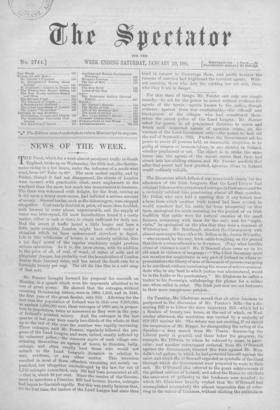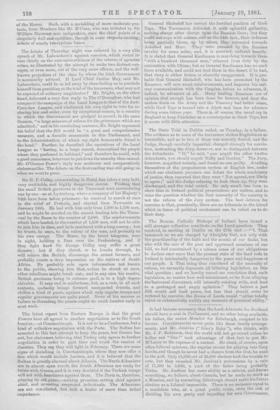On Tuesday, Mr. Gladstone moved that all other business be
postponed to the discussion of Mr. Forster's Bills—for a dis- arming Bill is to follow the more important Bill—which led to a Session of twenty-two hours, at the end of which, on Wed- nesday afternoon, the resolution was carried by a. majority of 218 (251 against 33). The debate was not exciting, if we except the suspension of Mr. Biggar, for disregarding the ruling of the Speaker—a fiery speech from Mr. Cowen, denouncing the Liberal party in general, and those below the gangway, for example, Mr. Dillwyn to whom he referred by name, in parti- cular; and another extravagant outbreak from Mr. O'Donnell against the Government, directed this time against Mr. Mun- della's red gaiters, in which he had protected himself against the snow, and which Mr. O'Donnell regarded as symbolic of the blood through which the Government were prepared to wade to their end. Mr. O'Donnell also referred to the great achievements of the gallant soldiers of Ireland, and asked the House to attribute the same sort of gallantry to the Irishmen now assailed ; to which Mr. Gladstone happily replied that Mr. O'Donnell had accomplished successfully the almost impossible fent of refer- ring to the valour of Irishmen, without eliciting the enthusiasm of the House. Such, with a sprinkling of more moderate pro- tests, from Members like Mr. M'Coan, who was irritated by Sir William Harcourt into indignation, wore the chief points of a singularly dull and spiritless, though in some respects exciting, debate of nearly twenty-four hours.







































